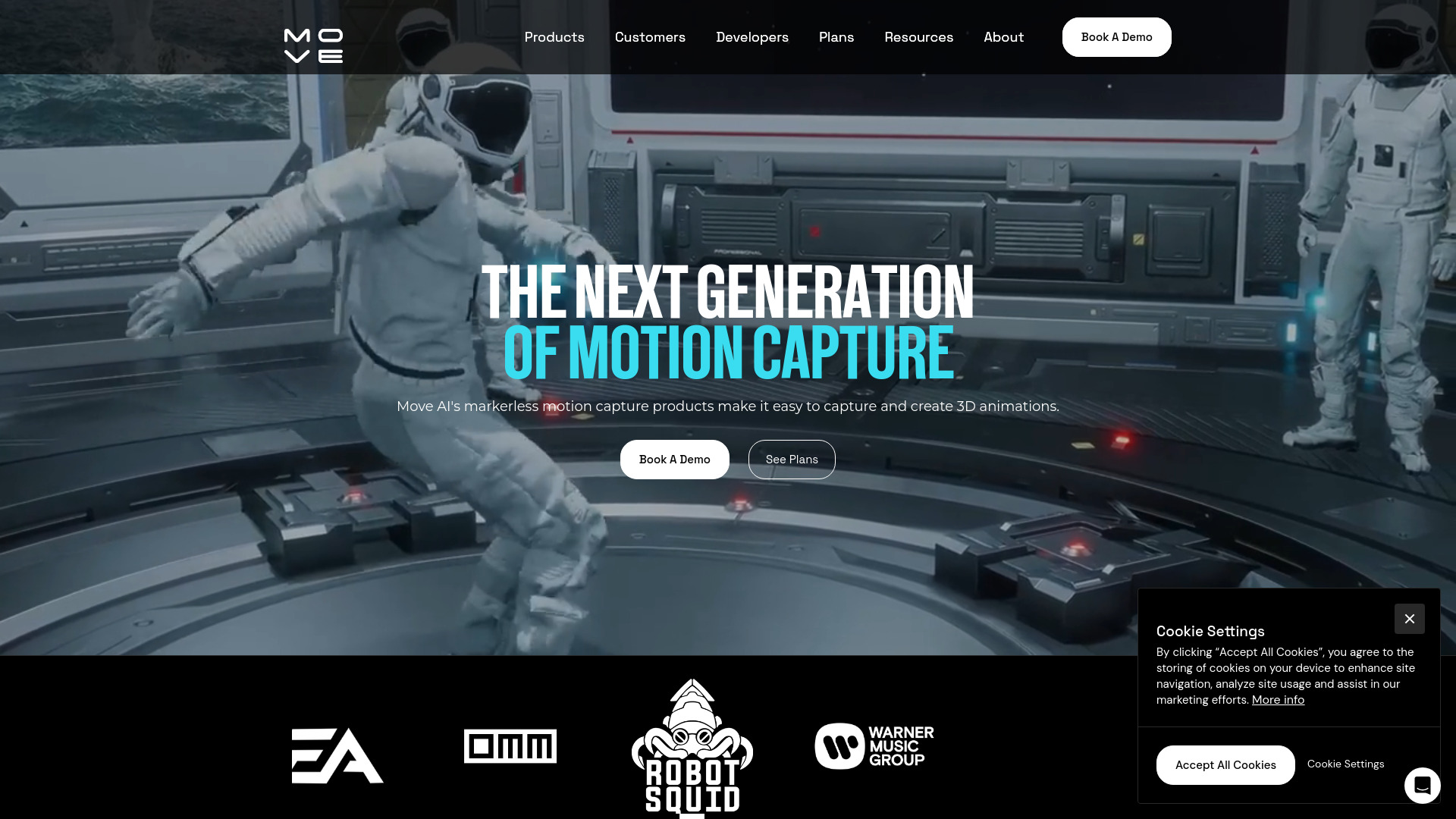- Home
- AI Animation Generator
- Move AI

Move AI
Open Website-
Tool Introduction:Transform 2D video into 3D human motion for lifelike animation
-
Inclusion Date:Oct 28, 2025
-
Social Media & Email:
Tool Information
What is Move AI
Move AI is a computer vision platform that converts ordinary 2D video into high-quality 3D motion data. Combining advanced AI with biomechanics and physics, it reconstructs realistic human movement that powers animated characters, simulation, and quantitative analysis. By reducing reliance on traditional motion-capture suits and stages, Move AI helps teams accelerate production, cut costs, and iterate faster. Its cross-industry workflows support entertainment, life sciences, and robotics, enabling more natural animation, better kinematic insights, and new interactive experiences built from everyday footage.
Move AI Key Features
- AI-driven 2D-to-3D motion reconstruction: Transforms standard video into structured 3D skeletons and trajectories suitable for animation and analysis.
- Biomechanics- and physics-informed modeling: Uses kinematic constraints and physics priors to produce lifelike joints, smoother motion, and reduced artifacts.
- Realistic human motion for characters: Generates motion that makes digital humans and animated characters feel natural and expressive.
- From existing footage to production assets: Leverages readily available 2D video, helping teams prototype and produce without full mocap stages.
- Efficiency and cost reduction: Speeds up iteration, limits reshoots, and streamlines pipelines for teams of all sizes.
- Cross-industry applicability: Purpose-built for entertainment, life sciences, and robotics workflows and research.
Who Should Use Move AI
Move AI suits studios, animators, and VFX teams aiming to create realistic character motion without extensive mocap infrastructure. It benefits researchers and clinicians studying human movement in life sciences, as well as robotics engineers who need human kinematics for control, simulation, or imitation learning. Indie creators, game developers, and R&D teams can also use it to turn accessible 2D footage into usable 3D motion for prototypes and production.
How to Use Move AI
- Record or gather suitable 2D video where the subject’s movement is clearly visible with adequate lighting and resolution.
- Create an account and start a new project to organize footage and outputs.
- Upload video and set basic parameters such as frame rate, segment range, or subject focus as required by your workflow.
- Run processing to reconstruct 3D motion; the system applies AI, biomechanics, and physics constraints.
- Review the results, preview motion, and refine inputs or settings if needed for improved fidelity.
- Export the 3D motion data and integrate it into animation, analysis, or robotics pipelines.
Move AI Industry Use Cases
Entertainment studios can convert dance or action footage into believable character animation for film, TV, or games, reducing turnaround time between previz and final shots. In life sciences, researchers can derive joint trajectories to study gait, balance, or rehabilitation outcomes across cohorts. Robotics teams can extract human kinematics from video to inform motion planning, imitation learning, or human-robot interaction experiments in simulation and hardware.
Move AI Pricing
Pricing and licensing details are provided by Move AI on its official website. Plans are tailored to production scale and industry needs; availability of trials or evaluations can change over time. For the most accurate information, review the vendor’s current terms or contact sales.
Move AI Pros and Cons
Pros:
- Generates realistic human motion from accessible 2D video.
- Biomechanics and physics priors help improve plausibility and smoothness.
- Accelerates production and lowers costs versus traditional mocap stages.
- Applicable across entertainment, life sciences, and robotics.
- Enables reuse of existing video libraries for animation and analysis.
Cons:
- Output quality depends on video clarity, occlusion, and camera viewpoints.
- Challenging edge cases or heavy occlusions may need manual cleanup.
- Some post-processing is often required for final, production-ready animation.
- Pipeline integration may require technical setup and validation.
Move AI FAQs
-
What is Move AI used for?
It converts 2D video into 3D motion data for realistic character animation, biomechanical analysis, and robotics research or control.
-
What videos work best?
Footage with clear views of the moving subject, sufficient resolution, good lighting, and minimal occlusions generally yields higher-fidelity reconstructions.
-
How accurate is the motion data?
Accuracy depends on video quality, scene complexity, and movement type. Using clearer footage and appropriate settings typically improves results.
-
Can it replace marker-based motion capture?
For many use cases, it reduces reliance on traditional mocap by producing realistic motion from video. Highly specialized captures may still benefit from dedicated setups.
-
Can I use the output in my pipeline?
Yes. The reconstructed 3D motion is intended for downstream use in animation, simulation, analysis, or robotics workflows.
-
Is real-time processing supported?
Move AI focuses on reconstructing motion from recorded video. Real-time capabilities and performance depend on workflow and should be confirmed with the vendor.



